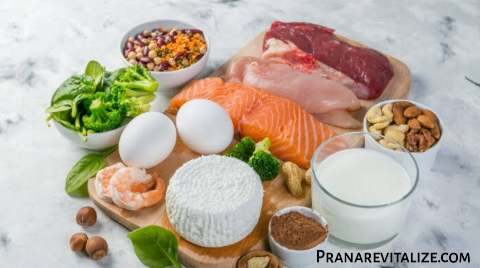
Protein is an important and great macronutrient that plays many roles in the human body regarding preserving health and sustaining well-being. Among all the important benefits related to proteins are the followings:
1. Muscle Building and Repair
Role: These are one of the major; important proteins that build and repair muscle tissues. They provide amino acids, which are very essential in the synthesis and recovery of muscles; hence, they are of paramount importance to athletes as well as those who do physical exercise.
Benefit: Good for muscle building, post-workout recuperation, and regular body strength.
2. Satiety and Weight Management
Role: Compared to fats and carbohydrates, protein is more satiating. It Utility keeps the individual full for a longer duration of time and helps prevent overall calorie intake.
Benefit: Helps in controlling weight by avoiding overeating, hence reaching a healthy weight level.
3. Health of Metabolism
Role: In comparison with fats and carbohydrates, protein has higher thermic food effects. It means that the body uses more energy in digestion, absorption, and processing protein than the oxidation of other macronutrients.
Benefit: It improves metabolic processes by possibly increasing the metabolic rate of expenditure.
4. Immune Response
Functions: Proteins take part in antibody and other component formations concerning the immunity system, which protect the body against infections and diseases.
Benefit: It improves the immune system and the effectiveness of the body in preventing sicknesses.
5. Hormone Production
Function: The proteins form a major substrate on which many hormones, like insulin and growth hormone, that are regulatory molecules, are made.
Benefits: It facilitates physiological functions in maintaining hormonal balance.
6. Enzymes Production
Role: Enzymes are proteins that exert a catalytic activity on many biochemical processes of the organism, from digestion and metabolism to elimination.
The rationale is that it confers the ability to effectively metabolize food and digest it properly.
7. Cellular Health
Functions: The proteins are very crucial in each cell of the body, whether for structure or function. They assist in repairing and regenerating cells.
This vitamin helps in maintaining cellular health as well as tissue repair.
Foods Rich in Protein
Following are some excellent sources of food proteins:
1. Lean Meats
Examples are chicken breast, turkey, and lean beef.
Protein: approximately 25-30 grams per 100 grams.
2. Fish and Seafood
Examples include salmon, tuna, shrimp.
Protein Content: It contains about 20-25 grams of protein per 100 grams.
3. Eggs
Protein Content: Roughly about 6 grams of protein in one large egg.
It is a source of high-quality protein with a complete amino acid profile.
4. Dairy Products
Examples include Greek yogurt, cottage cheese, and milk.
Protein Content: The serving amount of protein is about 10-20 grams, depending on the product.
5. Legumes
Examples include: lentils, chickpeas, black beans.
Protein content: Roughly 18 grams of protein per cooked cup.
6. Nuts and Seeds
Examples include almonds, chia seeds, and hemp seeds.
Protein: About 20-25 grams per 100 grams of nuts and seeds.
7. Tofu and Tempeh
Examples include: Tofu, tempeh (made from soy).
Protein content: Tofu contains about 8 grams per 100 grams; tempeh has around 20 grams per 100 grams.
8. Quinoa
Protein content: About 8 grams of protein per cooked cup.
Health Benefits: A full protein source, but on the other hand, this also supplies amino acids in the diet.
9. Edamame
Protein Content: Approximately 11 grams per 100 grams.
Benefit: Provides a good source of protein in a plant-based diet.
Conclusion
Consuming a broad array of protein-containing foods helps ensure adequate intake of all the essential amino acids to support many aspects of health. Regardless of whether you draw your protein from animal-based or plant-based sources, a diet containing sufficient amounts of protein will help ensure that you maintain muscle mass and metabolic health.


Leave a Reply